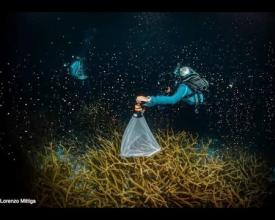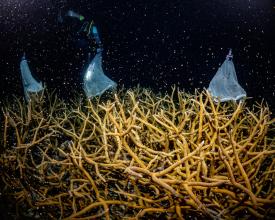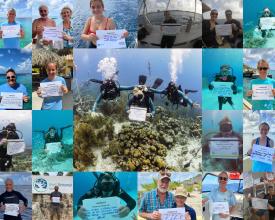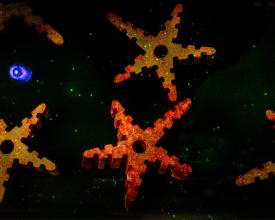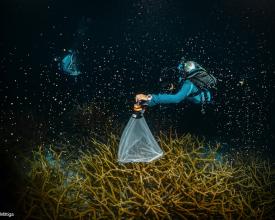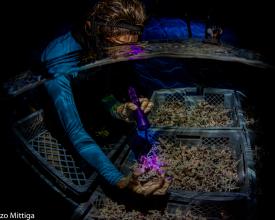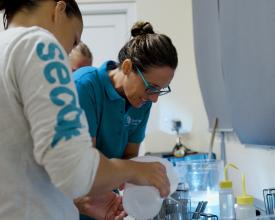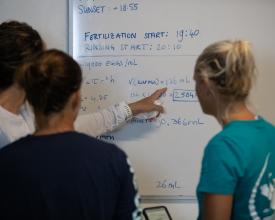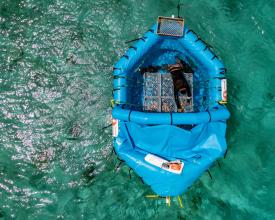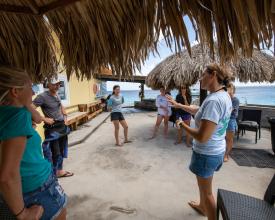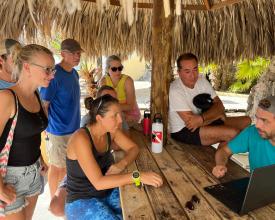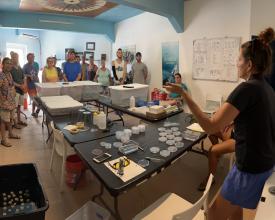Larval propagation to assist the recovery and resilience of Bonaire coral populations in the face of new diseases and environmental changes
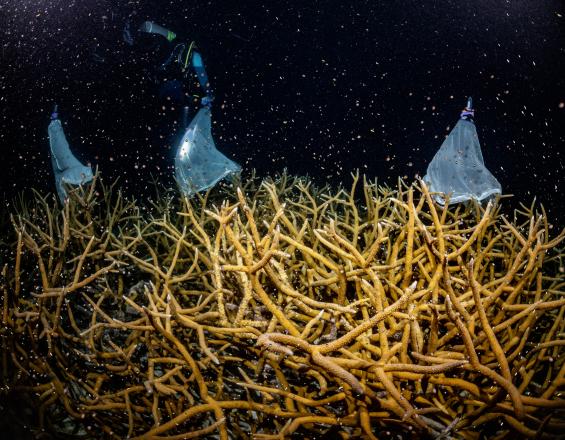
In the face of climate change and increasing pressure on our reefs, finding ways to increase the strength of coral populations and assist their recovery is paramount. Although some reefs in Bonaire still feature beautiful coral patches, some areas show visible signs of degradation. For this reason, it's important to rear larvae of key coral species, as genetic recombination could yield new strains that are better adapted to cope with changing environmental conditions. Reef Renewal Bonaire (RRFB) assisted the sexual reproduction of several coral species by propagating thousands of genetically unique coral settlers, which have been outplanted to the reefs or added to the genetic stock of RRFB's nurseries. The project was possible thanks to the establishment of key partnerships and the involvement of local dive operators and volunteers, who had the opportunity to experience the coral propagation process firsthand and its crucial role in reef preservation.
Context
Challenges addressed
Caribbean coral reefs are facing rapid ecosystem changes due to pervasive diseases, coral bleaching events, and local threats, such as overfishing, pollution and coastal development. Even Bonaire, whose reefs still feature significant populations of coral species, is not immune to regional trends. Healthy colonies may be too far apart to reproduce successfully through sexual reproduction alone, limiting the formation of new genetic strains. Managing local stressors while repopulating target reefs with resilient, genetically diverse coral populations is critical to preventing their irreversible loss. Integrating the Marine Park management plan with an active restoration strategy that facilitates coral sexual reproduction and promotes genetic recombination is important to give this species a higher chance to survive fast-spreading coral diseases and variable environmental conditions.
Location
Process
Summary of the process
Sharing knowledge, supporting one another, and engaging the local community has strengthened Reef Renewal Bonaire as an organization and increased its capacity to test and apply new methods and technologies, and allowed RRFB to continue to scale-up restoration efforts on Bonaire to maximize impact. At a time where halting reef degradation is critical, it's paramount to not waste time re-inventing the wheel and instead learn to work together constructively.
Building Blocks
Implementation and fine-tuning of technologies and methods to propagate corals
Larval propagation is a restoration method that assists coral sexual reproduction to increase the genetic diversity of corals. This technique can be used with numerous coral species and morphologies and, because of the large production of gametes during spawning events, it has the potential to scale up the number of outplanted corals on the reef. RRFB uses innovative technologies to reduce the labor, and handling time and increase the survivorship of coral larvae at large scales. After assisting fertilization, recently formed embryos are poured into floating pools (CRIB, Coral rearing in-situ Basin) designed by SECORE Int., where larvae settlement is facilitated on specially designed substrates which are then outplanted on the reef.
Enabling factors
-
The presence of healthy spawning coral colonies in Bonaire provides gametes to kick-start larval propagation.
-
The establishment of a strong partnership with SECORE International with a shared vision for coral reef restoration.
-
The support from the local diving community.
-
The involvement of a strong team of motivated and committed people.
-
The support from the local government and the non-governmental organization of STINAPA, allowing the restoration activities to take place within Bonaire National Marine Park boundaries.
Lesson learned
-
Begin implementing techniques on a small scale to account for varying local environmental conditions and find the most suitable locations for application
-
Set-up first trials using predictable and “easy to work with” coral species
-
Adapt larval propagation techniques to local conditions, resources availability and priorities
Key partnerships to share expertise and resources
In June 2019, RRFB started the first larval propagation project in Bonaire in collaboration with SECORE International. The goal of the partnership is to establish a technical cooperation in which RRFB provides local knowledge, manpower, field logistics, and a facility, and shares all field trial results, monitoring data, and qualitative feedback on methodologies and technologies provided by SECORE Int. In return, SECORE Int. provides techniques, methodologies, expertise and training sessions on larval propagation. This partnership's knowledge was crucial for successfully implementing larval propagation techniques in Bonaire. By consistently sharing results and lessons learned, the technique was improved, leading to greater success and scalability for future project replication.
Enabling factors
-
The existence of a well developed and effective global network of scientists and practitioners willing to constructively share knowledge.
-
A formalized partnership with well-defined roles and responsibilities.
-
The opportunity for and committment to scheduling regular virtual and in-person training sessions.
-
Having a shared vision and goals among partners.
Lesson learned
-
Importance of scheduling regular meetings with partners before and after each major step of technique implementation to formalize results, feedback and lessons learnt.
Community involvement and outreach
Involving people directly in the reef restoration effort and being actively part of the solution is crucial for its overall success. With the help of local dive operators, Reef Renewal Bonaire trains volunteers that participate side-by-side with the staff in day-to-day field activities. Trained divers are pivotal in sharing RRFB’s vision with the wider community and becoming natural ambassadors for reef preservation and restoration.
Educational programs and tailored experiences are organized for schools, youth groups, local businesses, and authorities aimed at involving them in different levels of restoration efforts, while allowing them to see the results of the project, firsthand.
Furthermore, located in shallow water, the nurseries and outplanting sites are easily accessible by divers, snorkelers, and surface explorers, becoming an attraction not only to visitors of the islands but also to local community groups.
Enabling factors
-
A community recognizing the value of coral reefs and caring for their preservation.
-
Dive operators are willing to work together for a common cause, setting aside competitive aspects of the business.
-
Strong support of the local dive operators and overall the local diving community (ie. providing scuba tanks for volunteers).
Lesson learned
-
Involve the stakeholders well in advance and methodically gauge their involvement, participation and satisfaction.
-
Find ways to keep the volunteers motivated and engaged.
-
Consider that volunteer coordination takes time and patience.
Impacts
- Larval propagation and rearing protocols were implemented and hundreds of thousands of coral larvae of different coral species were successfully reared in the lab and in-situ floating pools.
- About 1,250 ceramic substrates with genetically unique coral settlers were outplanted on a degraded reef area of 1,200m2. The surplus of produced coral larvae was released back into the ocean to naturally settle on nearby reefs, extending the benefit of the project beyond the target area.
- 24 new strains of two coral species were introduced to the current genetic stock present in Bonaire’s in-situ nursery propagation system. These young corals will be used as broodstock to propagate thousands of corals via fragmentation every year.
- Spawning data observations in Bonaire were shared within the region to fine-tune the spawning predictions for the South Caribbean.
- Two important partnerships were formalized, strengthening technical cooperation and building capacity for future projects.
- The local and international visibility of the larval propagation technique as a critical component of the coral restoration project in Bonaire.
- The involvement of local dive operators and volunteers in the project has given ownership, built capacity, and laid the foundation for the project to continue even after completion.
Beneficiaries
-
Bonaire’s local community and visitors, who gain a stronger and healthier reef, a core component of the island's economy
-
STINAPA, Bonaire's National Marine Park management organization
-
Participating local dive operators and volunteers
-
Schools and local youth
Sustainable Development Goals
Story
Larval propagation of coral species on Bonaire wouldn't be possible without the involvement of many people from different parts of the community (local dive operators, residents, institutional partners, etc). Each person has their own reason for donating their time and energy to this project, with the common theme being ensuring the resilience of Bonaire's reef ecosystem.
We highlight the perspectives of 2 stakeholders involved in our larval propagation program - one a local dive operator and the other a resident volunteer:
"As a dive operator, giving back to the Reef is a must. If we can participate in any activity that involves conservation, restoration and education efforts, we’ll be the first ones to raise our hands and push forward. Coral spawning efforts summarize what we all strive for: giving a helping hand to our beloved reef.
Personally, being involved in spawning dives in the past, present, and (hopefully) the future counts as my small contribution to such a HUGE effort to preserve the reef we love. From scouting possible colonies, to netting and collecting gametes, spawning is something that rewards and justifies my existence and support towards RRFB's restoration efforts on Bonaire!"
-Augusto Montburn, Dive Shop Manager
"My favorite part of being involved in brain coral spawning dives was watching them release their gametes. It was beautiful to see and incredible to be involved in some small way. Coral spawning is where it begins - and anything I can do to give back to our beautiful reefs here in Bonaire is totally worth it!"
-Ellen McGraw, dedicated Reef Renewal Bonaire volunteer
